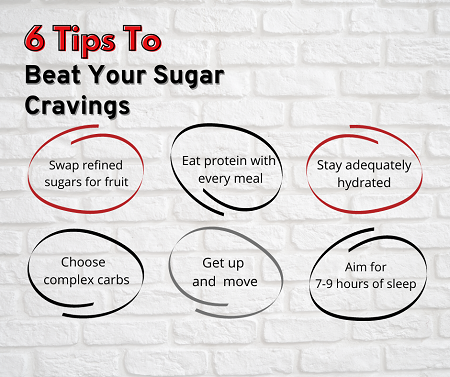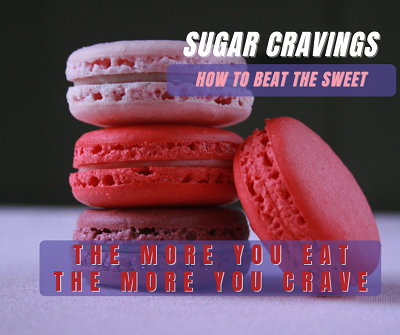a nutrition series by Michelle Chappel
Feel like you’re addicted to sugar? Do you find yourself reaching for that sweet treat multiple times a day? Maybe you start your day off with sweet coffee and a doughnut or reach for that office baked good around 3 pm every day or can’t have dinner without your dessert. Well, you’re not alone. Many people consider themselves addicted to sugar and go to great lengths to beat the cravings.
There are numerous reasons you may be craving sugar regularly. Sugar craving could be due to a nutritional deficiency, the overconsumption of certain foods, or simply a learned behavior that needs changing.
Another problem is most foods are created to be highly palatable and addictive. Sugar is the most popular ingredient added to foods in the US. (1) Not only do our taste buds enjoy it, the sugar we eat releases the chemical messenger dopamine, associated with pleasure and our reward response, which makes it more challenging to kick. (2)
So how do we quit sugar? Not by going cold turkey. The thing is, the more we avoid, eliminate, and deprive ourselves of the things we want, the more we crave them. (3) The key to kicking the habit is by learning ways to curb it and keep it in check. How do we do this? With a few swaps and a new way of thinking.
Rather than giving in to that pastry at work or the candy bar on the go, try looking at your daily meals. Do they contain enough complex carbohydrates, protein, and fat?
Start by choosing complex carbs, such as whole grains, brown rice, legumes, and starchy vegetables that are harder to break down. Simple carbohydrates, such as baked goods, candy and refined grains break down quickly and enter the bloodstream fast, raising insulin levels. This quick breakdown of simple carbohydrates often leaves you feeling unsatisfied and wanting more.

Another way to balance blood sugar spikes and dips is by including protein and healthy fats in your meals. Protein and fats slow the release of sugar into the bloodstream. Diets that contain too little protein and fat result in blood sugar spikes followed by a quick drop making you crave sugar for that quick boost of energy. A piece of toast with jam will break down faster than toast with avocado and egg. So if you’re looking to make your meals last longer add in the extra protein.
There is some belief that sugar cravings are linked to mineral deficiencies such as magnesium, iron, and zinc. However, research is inconclusive and limited on this. I can see how one might make this connection. Much like when your diet is low on energy-producing carbohydrates, when your iron levels are low, you can feel fatigued.
What do you turn to when you’re feeling “low energy”? Sugar. As for magnesium, many people are not meeting the RDA for magnesium (320mg for adult females and 420mg for adult males). Magnesium plays an important role in glucose metabolism and energy production. Long-term low magnesium levels can affect insulin resistance, (4) thereby contributing to that blood sugar imbalance.
Behavioral changes may feel hard to do, but they often are one of the easiest changes you can make. Remember, all you need to make a change is to start with a single step in the right direction.
Your first step can be as simple as stopping to ask yourself “why?” when the craving hits. Chances are you are reaching for sugar because of one of these responses:
I’m bored. I’ve been doing the same thing for too long i.e., sitting at my desk staring at the computer screen for hours. Or driving for miles.
I’m tired. I didn’t sleep well last night. Aim for 7-9 hours of sleep to keep hormones in check and avoid fatigue-provoked hunger cravings.
I’m dehydrated. Many times, when you think you’re hungry, you’re just thirsty. And if you’re thirsty, you’re probably already dehydrated.
I’m stressed, sad, or just emotional eating. Increases in cortisol due to stress can result in the overconsumption of calories often in the form of sweet foods. (5)
So how do you change the behavior?
Redirect your boredom: get up and stretch, take a short walk around the office, chat with a colleague, take a walk to the water cooler and refill your water bottle (chances are you need that water), bust out a few squats and lunges. Change up your position and what you are doing. Get the blood flowing to wake you up. Far more effective than a cinnamon bun.
Incorporate stress relievers into your routine: meditation, yoga, a walk in nature.
Make simple swaps: try fruit instead of refined sugar. Enjoy a piece of dark chocolate or a spoonful of nut butter. Make a cup of tea with honey or indulge in a golden latte or hot chocolate. Can’t get away from your love of cookies? Make a batch of mini cookies and limit yourself to just one. No one said you can’t ever have sweets again. The goal is to reduce the amount and change the patterns. Make these small steps and before you know it, you’ll be looking at that cup of tea like it’s a decadent dessert.
The next time you find yourself craving sweets, take a closer look to see what else could be contributing to your sweet tooth, and then try out one of these healthier options.
Sources:
1. Westwater, et al. Sugar addiction: the state of the science. Eur J Nutr (2016) 55 (Suppl2):S55–S69 DOI 10.1007/s00394-016-1229-6 2. Avena, Nicole M et al. “Evidence for sugar addiction: behavioral and neurochemical effects of intermittent, excessive sugar intake.” Neuroscience and biobehavioral reviews vol. 32,1 (2008): 20-39. doi:10.1016/j.neubiorev.2007.04.019 3. Stice, Eric et al. “Caloric deprivation increases responsivity of attention and reward brain regions to intake, anticipated intake, and images of palatable foods.” NeuroImage vol. 67 (2013): 322-30. doi:10.1016/j.neuroimage.2012.11.028
4. Gröber, Uwe et al. “Magnesium in Prevention and Therapy.” Nutrients vol. 7,9 8199-226. 23 Sep. 2015, doi:10.3390/nu7095388 5. Epel, E et al. “Stress may add bite to appetite in women: a laboratory study of stress-induced cortisol and eating behavior.” Psychoneuroendocrinology vol. 26,1 (2001): 37-49. doi:10.1016/s0306-4530(00)00035-4

